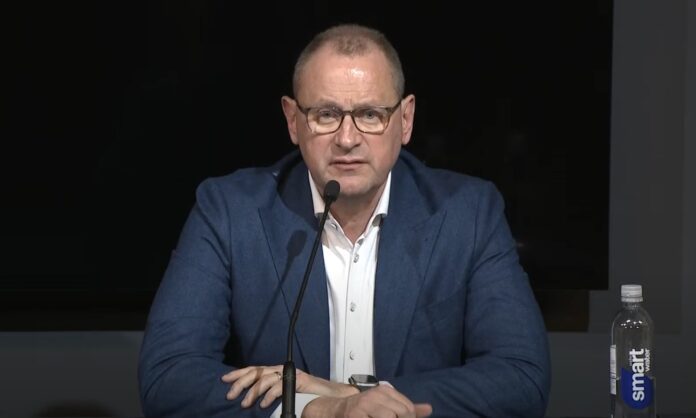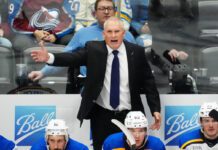
At Friday’s press conference, Maple Leafs GM Brad Treliving discussed the firing of Sheldon Keefe, the coaching search, the possibility of core player personnel changes, and the reasons for falling short in the 2024 playoffs.
Treliving’s statement on the dismissal of Sheldon Keefe
First and foremost, I want to offer my sincere thank you to Sheldon.
We had an opportunity to work together for a year. We went through a very detailed process. I said it at the time. I didn’t know Sheldon at the time when I came in. We went through a really detailed, long, and sometimes difficult process when I got here. I believe today, as I did that day, that keeping Sheldon here was the right call.
This is a really good coach. This is a really good coach. It is an excellent person. The difficulty of this business is that sometimes really good people — and people who are good at their jobs — have to be changed.
When I look back at the 11 months I spent with Sheldon, I do consider him an excellent coach. This does not fall at his feet. By no means do I want it to be taken that by making a change at the head coach position, all arrows point at Sheldon.
I also couldn’t just look at the past year in a vacuum. I will talk a little bit in terms of the review of the season, but I had to take into consideration the totality of Sheldon’s time here. At the end of the day, it was my decision, and I felt strongly that a new voice was needed. We had gotten to a place where a new voice was needed.
That is the unfortunate part of this business. I do not believe that you churn coaches and keep churning coaches. I don’t think that is a recipe for success at all. I just felt that, at the end of the day, when I looked at the totality of his time here, a change was required.
I know Sheldon is not going to be out of work long. This is a really good coach who is going to do a lot of really good things moving forward. I want to make sure I state in the opening that I wish him and his family nothing but the best moving forward.
Treliving’s reflections on the 2023-24 season
When I quickly look at the season, ultimately, we fell short. We didn’t accomplish the goals that we had set for ourselves that I felt were attainable. Some years, you look back on where you meet expectations and where you exceed expectations. To me, we fell short. We left some on the table.
Ultimately, that responsibility is mine. I was brought in here. The hockey operations are under my peruse — the players, the coaches, the staff. I take full responsibility for everything that goes on on the ice.
When I look at our season, I think it was an uneven season to start. We integrated new players. When I look at our goaltending situation, it was turbulent early on. We went through some injuries on the blue line. I thought we stabilized going into the new year.
Getting into our playoffs, we had some players who missed some time, but I really feel the ultimate area that we fell short on is a consistent pattern that we have had here. We didn’t score enough goals, and we were the second-best team on special teams in the series. Those are areas that we tried to look at. Those are areas we tried to look at over the course of the summer, but we will continue to look at them.
As Brendan said, when you go through a season as we have, everything must be on the table. Everything needs to be looked at. Everything needs to be considered.
Treliving’s updates/clarifications on Matthews, Woll, McMann, Nylander, and Dewar’s injury situations
I would like to close with a couple of injury updates and clarifications. Bobby McMann—I can’t remember the date now, but in the home game against Detroit, he suffered an MCL sprain in his knee. The original diagnosis, we thought, was going to be 6-7 weeks. He was moving forward. We anticipated that, at some point, if we were to get to the second round, he would’ve been available.
Auston Matthews, at the end of Game 2, became really sick. Our original thought was that, with as sick as he was, there was maybe a food poisoning of some description. It was a virus that stuck with him throughout Game 3. He suffered a hit in Game 4 that we couldn’t rule out… We don’t know if it was a combination of the sickness and the hit, but he was presenting head injury issues. We pulled him. We weren’t going to clear him until those things cleared, which they did on the morning or afternoon of Game 7.
William Nylander spoke to it during his availability. Prior to the playoffs starting, he suffered severe migraines. Again, it was to the point where we had to look at the symptoms as possible head injury and concussion symptoms. He was cleared of those and returned to play.
Connor Dewar is undergoing shoulder surgery today. We anticipate that he will be back for training camp.
Finally, Joe Woll suffered an SI joint sprain—a sprained back—at the conclusion of Game 6, making him unavailable for Game 7.
Q&A
There have been rumours that Craig Berube is at the top of the coaching list. Is there any truth to those rumours, how wide do you cast your net, and when do you expect to have this done?
Treliving: There are some good coaching candidates out there. I am not going to get into specific individuals.
As far as a timeline, we want to be thorough, but we also understand there are other openings. It was a difficult day yesterday. The process that we went through up until the puck went into the net on Saturday night—our focus is solely on trying to win that series. You then go through all of the stages, right? I believe you have to step back. You don’t want to make emotional decisions. It has been emotional. It still is.
I wanted to deal with Sheldon properly, really be clear, and think that process through. I spent some quality time with him. Once that decision is made, it’s getting onto the next step. We began that yesterday.
We are not waiting. We are going to be thorough. This isn’t something that will be done hastily, but we certainly know there are some quality candidates out there and want to get to them as fast as we can.
We heard almost every player talk about how they feel like they are close. The organization has one series win in 20 years. What are they close to? Is one series win acceptable? If so, doesn’t the culture have to change a little bit? Does the bar have to be raised?
Treliving: The simple answer, and it is not just paying it lip service, is that it is not acceptable. That is why we have to dive into this thing. I don’t believe you throw a body on the tarmac to say we have done something.
The comments to the media get played, and I don’t pay a lot of attention to that. I pay a lot of attention to the comments that I have with the players in the meetings that we have with the players. They understand. They understand that we have fallen short.
As Brendan says, there is a time for patience. There is a time in this game when you have to preach patience, but I think we are at a point where if we see it’s repeated, we have to dig into it.
Ultimately, no, the results… Sitting here today, we think we should still be playing. It isn’t acceptable.
The Leafs have always struggled to break down the other team’s goalie in the playoffs. What are you going to do about goaltending to ensure the Leafs don’t have the second-best goalie in the series?
Treliving: It is a good question.
When I have gone back now and kind of looked at, there are some similar touchpoints, right? One of them is that we haven’t scored enough. This team has scored in the regular season. It hasn’t scored in the playoffs. We increased our scoring in the regular season this year. We were the second-highest-scoring team in the NHL and number one scoring team in the East. We increased our total goals by 20 this year over the previous year.
One of the things I wanted to try to do: It isn’t total goals. It is how the goals are scored in the playoffs. You score differently in the playoffs than in the regular season. Is it systematic? Is it personnel? Most of us would understand it is more difficult. You are defended harder in the playoffs.
We haven’t scored enough. Our special teams haven’t been good enough. To your question, we seem to be turning the other team’s goalie into the first star every night. It is two-fold. We have to find a way, systematically and personnel-wise, to score more in the playoffs and score those goals that are scored in the playoffs.
As far as our goaltending, I have faith in Joe. Like everybody else, there are questions. The biggest question with Joe is that he has gotten injured a lot. We have to dig into that. Sometimes that happens. Sometimes bad luck happens. Is there a training issue we have to deal with? Do we need to change something in his off-ice routine? All of those things are what we have to dig into.
I believe in Joe as a goaltender. We have to support Joe. Ilya’s contract is up, but we certainly have to try to put ourselves in a position where we don’t have the second-best goaltender in each of these series. I think it is a function of both sides—not just our goaltending but also what we do to make things difficult on the other team’s goaltender.
You mentioned that a new voice is needed behind the bench. What does that voice need to say? Why do you think that this group of players would heed a new voice or message anyway?
Treliving: That is always the difficult part of the decision. As I said, I don’t question that we had a really good coach here. Unfortunately, sometimes in this business, over a period of time, the message… I don’t want to say they stop listening, but the message stops hitting home.
That is not just a coaching issue. In player personnel, we have to look at those things. It is not just changing the personnel but understanding why a message may not be getting through. Our focus right now is on trying to find that individual.
There is not just one magic point here. I look at our team, and as we evaluate it over the course of the coming weeks, we have to find a way to do the hard, unsexy things longer. Those things don’t require skill. There are some things in our sport, especially at this time of the year, that are not related to skill but help you win.
That is not to say you have to get rid of skill. You need skill and talent to win. But to me, we need a voice that can bring that out.
For the past several years, the team has had four high-priced players who take up about 50% of the salary cap space. Winning teams don’t seem to be structured that way. Does that philosophy need to change?
Treliving: As we said, the short answer is that we have to look at everything. We don’t have to revisit the history of when those contracts were done. We ran into a pandemic. A lot of things happened.
Again, I have to expand the view. I have a 12-month view of this thing. We have really good players, but it hasn’t worked, right? It hasn’t worked to date. Again, you were not going to come out here and make emotional decisions or decisions so that we can have another press conference where we can say, “Look at what we have done!” That makes no sense, but you have to analyze why it hasn’t worked.
Certainly, you can have a viewpoint and say, “We have invested in four players for X% of the salary cap, and if we spread it all around, you are going to have more depth and those types of things.” We are where we are. This is the situation we are in. Those are really good players. We have to dig into why we are ending up with the same result year after year and adjust accordingly.
When you spend so much on so few players, it doesn’t seem to leave you a lot of money left over for the “chemistry” and “unity” of the team. Does Keith Pelley’s philosophy conflict with how things have been handled over the last nine years? Do you see how it affects how you negotiate with anyone who is potentially looking for a new deal in the near future?
Treliving: Two things. Understanding how it has played out, while I wasn’t here then and don’t want to speak to it, I don’t ever think the philosophy was, “We are going to spend half our money on a small number of players.” Things happen. Salary caps didn’t grow as we all projected. But we are where we are.
Taking out salaries and all of the other stuff, I know there is talk of the core four and all of these names we talk about, but we don’t talk about them internally. What we have to do is make sure everybody is important. Everybody has to feel important.
I would disagree with the idea that things have never changed here. There has been a lot of change. Obviously, there has been a lot of change around those core players. This isn’t the players’ feelings, but we have to make sure everybody feels important here. This can’t go on the backs on four, three, or two individuals. This is about the Toronto Maple Leafs. It is not about one, two, or three people.
Salary aside, that was one of the things I really wanted to try to change when coming here. Everybody is important. Winning teams have the unique ability for everybody to feel that if they weren’t part of it, we wouldn’t accomplish the goal regardless of minutes played or dollars earned. Everybody is important.
That is what is going to happen here. Forget about what you are cashing on the 1st and 15th. We can only have success here if the top of the food chain and number 23 on the list are important. And they are.





























![New Leaf Anthony Stolarz on the opportunity in Toronto: “In Florida, I knew my role as a backup… Now, [Joseph Woll] and I are competing for starts… As a goalie, that’s all you can ask for” Anthony Stolarz, Stanley Cup win, now Maple Leaf](https://mapleleafshotstove.com/wp-content/uploads/2024/07/anthony-stolarz-sc-100x70.jpg)
